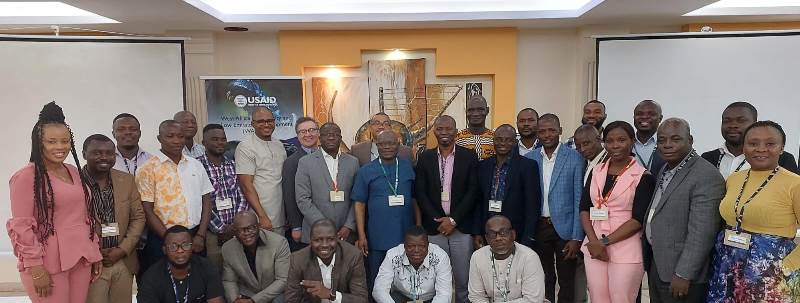MONROVIA, LIBERIA-The USAID-funded West Africa Biodiversity and Low Emissions Development (WABiLED) program, in collaboration with government and non-governmental partners in Liberia and Sierra Leone, organized a five-day knowledge-sharing and capacity-strengthening training on Reducing Emissions from Deforestation and Forest Degradation (REDD+) readiness and Low Emissions Development (LED), to combat climate-changing greenhouse gas emissions (GHG) in the two countries.
In recognition of the role that deforestation and forest degradation play in contributing to GHG emissions, the international community developed the REDD+ mechanism under the United Nations Framework Convention on Climate Change (UNFCCC). The primary aim of REDD+ is to encourage developing countries to actively participate in global climate change mitigation efforts by reducing deforestation, forest degradation, and land use, often the largest contributors to GHG emissions in lesser-industrialized countries.
In addition to reducing GHG emissions from deforestation and forest degradation, REDD+ actively promotes enhancing carbon sequestration through conservation, sustainable management, and forest landscape restoration.
To ensure the training meets the needs of the countries, WABiLED conducted a comprehensive needs assessment of REDD+ and low emissions development strategies (LEDS) in four high forest biodiversity countries (Côte d’Ivoire, Guinea, Liberia, and Sierra Leone) in the Upper Guinean Forest Ecosystem.
The objective of the assessment was to work with REDD+ and LEDS practitioners to identify key areas where additional technical support can boost the delivery of REDD+ and LEDS initiatives.
The findings from the assessment indicate that these four countries are at various stages of REDD+ implementation. While some have made substantial progress and are transitioning from the REDD+ readiness phase to the demonstration phase, others are still in the early stages of REDD+ readiness.
The training presented a series of modules on how to achieve the steps in the REDD+ process and identified pathways for increased cooperation and learning exchange, through a community of practice on REDD+ in the region.
Resource persons from Ghana, the first West African country to receive results-based payments from REDD+ GHG emissions reductions, shared their experiences on Ghana’s processes and achievements in reaching this critical REDD+ milestone.
In a keynote address to open the training, Conrado Garcia from USAID Liberia said, “The USAID-funded WABiLED program works within the Trans boundary forest landscapes of the Upper Guinean Forest and compliments the bilateral efforts in each country. This capacity-building activity will help Liberia and Sierra Leone’s delivery of REDD+, including international reporting on carbon finance initiatives.”
In an opening remark to commence the workshop, Harrison S. Karnwea, the Forestry Development Authority Board Chairman said, “The forest is only valuable when it is standing. When you cut it down and it becomes wood, the value is gone. We are happy to have the USAID-funded WABiLED and Conservation Works projects to help Liberia reach our target, which is to have 30% of our forest under protection.”
Bintu Sia Foray-Musa Kamara, the Protected Area Manager of the National Protected Area Authority in Sierra Leone, said: “It is interesting to know that the Ghana REDD+ program has a transparent benefit sharing mechanism through a multistakeholder approach, which other countries can learn from.”
Training participants included representatives from key organizations in the region. Liberia was represented by staff from the REDD+ Implementation Unit (RIU) of the Forest Development Authority FDA) and the Environmental Protection Agency of Liberia (EPA-L).
Sierra Leone drew participants from the National Protected Area Authority (NPAA-SL), the Environmental Protection Agency of Sierra Leone (EPA-SL), and the Forestry Department of the Ministry of Agriculture and Forestry (MAF).
Resources persons from the National REDD+ Secretariat of the Climate Change Directorate of Ghana Forestry Commission also contributed their expertise to the knowledge-sharing event along with the WABiLED REDD+ and LEDS Specialists.
At the end of the workshop, participants identified priority areas for increased attention. These included the need to prioritize the factors contributing to deforestation and forest degradation, the formulation of policies and measures relevant to REDD+ strategic activities, the crafting or finalizing national REDD+ strategies, the implementation of robust national forest monitoring systems, and the establishment of robust safeguard information systems.
About WABiLED
The West Africa Biodiversity and Low Emissions Development (WABiLED) Program is a four-year program funded by the United States Agency for International Development (USAID), with three main objectives: combat human trafficking wildlife and improve the conservation of great apes; reduce deforestation, forest degradation, and biodiversity loss in key trans boundary landscapes; and reduce greenhouse gas emissions and increase carbon sequestration derived from forest and land use.

